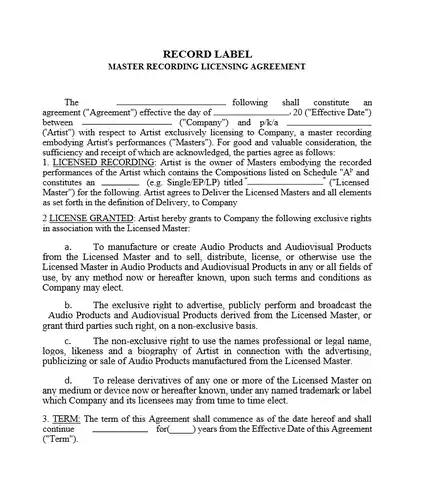Creating a label contract is an important step in the music industry. Not only does it help ensure artist royalties are paid correctly, but it also establishes clear expectations between both parties. This blog post will outline the steps necessary to create a successful label contract and discuss the benefits of having one. So if you’re ever looking to ensure your music gets the exposure it deserves, read on!
What is a label contract?
A label contract is a legal document that establishes the terms and conditions under which a record producer or distributor will produce labels for a particular artist or group. A contract can include royalties, advance payments, marketing expenses, and more.
Label contracts are important because they help to protect both the artist and the label. For example, if an artist signs with a record company but never produce any music, the company may not be able to distribute their album properly.

A contract would specify how much money should be paid to the artists for producing no music (royalties), how much money should go towards marketing efforts (advance payments), what expenses are allowable concerning recording sessions (expenses related to production such as studio time), etc.
The importance of label contracts cannot be overstated; without them, many successful artists would not have succeeded due to disputes between parties involved in their career path.
Why is a label contract important?
A label contract is important because it helps protect the seller’s and buyer’s interests.
A label contract ensures that both parties are happy with the deal.
A label contract prevents misunderstandings.
A label contract is important because it helps to ensure that both parties fulfill their contractual obligations.
In a nutshell, a label keeps everything organized and on track, so there are no surprises later down the road.
What are the benefits of having a label contract?
A label contract is an agreement between two or more parties that specifies the terms and conditions for producing, using, marketing, selling, or distributing products. In other words, it’s a formal way to ensure that all parties involved in a product’s production and distribution are on the same page.
The benefits of having a contract include the following:
- Time savings – A label can help reduce the time needed to produce products by specifying exactly what needs to be done from start to finish. This helps you focus on higher-value tasks rather than navigating through endless paperwork and tedious negotiations.
- Improved quality – By specifying precisely how products should be produced, processed, packaged, and labeled, you can ensure high-quality standards throughout the process. This eliminates any room for error and ensures consistent results across different batches or shipments.
- Reduced errors – A label reduces the number of errors made during production processes, such as labeling, packing, and shipping. It also ensures that products meet specific specifications in color, size, shape, etcetera.
- Maintaining consistency over time – A well-crafted label will help keep your product quality level consistent by ensuring compliance with specified criteria (e g., dimensions) at all stages of production .” Overall, having an effective label is beneficial both financially (through reduced costs )and professionally (by improving overall quality ).
4 Tips to make the Perfect label contract.
A label contract is an essential part of any business. It’s a legal document establishing the terms and conditions under which your company will produce and distribute its products. A good label contract should be tailored to your company’s specific needs, be clear and concise, include all the relevant details, and be signed and sealed in legal form.
Read Also: 13+ Awesome Water Bottle Label Template: Tips, Benefits, and The Ultimate Guide to Create It
Here are four tips for creating a great label contract:
- Make sure you understand what you need from the label agreement before drafting it. This includes everything from who will access product specifications to how royalties will be calculated. The more detailed you can get ahead of time, the easier it will be to negotiate on behalf of both parties during negotiations
- Be realistic about what can happen given your current situation – don’t expect every clause in a Label Contract to come true immediately or without some compromise on either side
- Writing clarity into legally binding contracts has benefits beyond just making things easy for everyone involved- judges tend to take notice when agreements are drafted intelligently and with attention paid to detail
- Drafting labels doesn’t have to involve expensive attorney fees – there are plenty of free resources available online that can help guide you through all the important steps needed for completing an effective contract
Conclusion
With all of the different eCommerce platforms, it can be hard to know which is the best for your business. And with so many suppliers and manufacturers available, it’s even harder to determine trustworthy ones.
That’s where a label contract comes in: It helps you cut through all the clutter and find a supplier that will meet your needs. In this blog post, we discuss the importance of label contracts and how to create one perfect for your business. Hopefully, this information will help you decide which eCommerce platform to choose for your business.




